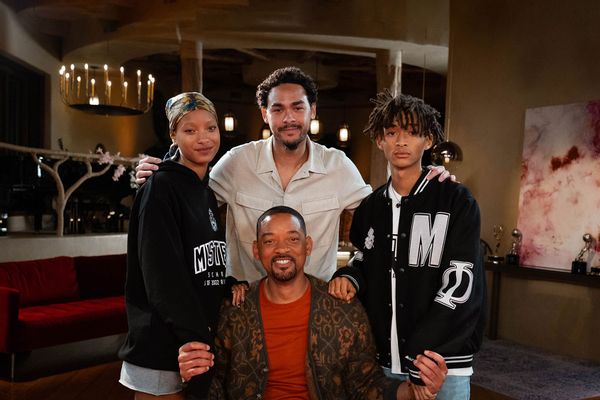Will Smith presides over the most bizarre “Red Table Talk” yet – to talk trauma, but avoid the slap
In the course of filming the 1979 cinematic classic “Apocalypse Now,” Francis Ford Coppola pushed his cast and crew to such extremes that his star Martin Sheen ended up having a heart attack and a breakdown.
A dozen years passed before most of the public heard about that or the rest of the behind-the-scenes mess that plagued “Apocalypse Now.” It officially became public via “Hearts of Darkness: A Filmmaker’s Apocalypse,” a documentary co-directed and narrated by Coppola’s wife Eleanor using the copious footage she took of the production.
It’s possible that cinema buffs heard rumors before it that, for example, Sheen was so blind drunk in that opening scene featuring his character unraveling, that he actually cut himself while punching that mirror, which means the blood he smeared across his face was real.
All of this speaks to a level of artistic commitment that is more frightening than impressive. Explaining that he told Coppola to keep the camera running while he was spurting all that red, Sheen says, “It had to do with facing my worst enemy: myself. I was in a chaotic spiritual state inside.”
Our relationship with movie stars, the art of filmmaking, and behind-the-scenes movie set gossip has vastly changed in the three decades since “Hearts of Darkness.” Each is now part of a film’s marketing, especially when they intermingle with each other.
The Smith family comprehends this in ways most don’t. Instead of gossip taking years to come to light, social media may expose it within weeks or days. A person’s inner chaos is more likely to spill out right in front of us in real time, therefore reducing the span between golden status and potential ruin to seconds. Social media also gives stars more power than ever to shape their message and cultivate followers to believe them – and believe in them.
This brings us to Wednesday’s “Red Table Talk” featuring Will Smith . . . without wife Jada Pinkett Smith and mother-in-law Adrienne Banfield-Norris joining him.
Billed as a “takeover,” Smith’s turn as guest host is a predictable stop on his limited press tour for “Emancipation.” His most public talk show appearances so far include submitting to probing but empathetic questions from Trevor Noah and sitting down with retired NBA star Matt Barnes and Stephen Jackson, hosts of the Showtime podcast “All the Smoke.”
Wednesday plops him amidst his least hostile interviewers yet: his daughter Willow, a regular “Red Table Talk” co-host, alongside his sons Jaden and Trey. Noah provided Smith with a broadcast forum to break his silence regarding the Oscars night incident.
On “Red Table Talk,” Smith’s children listen as he explains the visceral impact the part of the escaped enslaved man known as “Whipped Peter” had on him. They nod. They sympathize with their father’s internalized angst. A few times Jaden blurts some version of, “That’s crazy.” Not once during the episode’s nearly 36-minute run was Smith’s awards show mess mentioned, so if you’re thinking about tuning in for related dish, save yourself the time.
Making great art doesn’t necessitate pain. Relatedly, experiencing that art should not be painful.
As public relations exercise, it’s worth studying from several points of view. One reaffirms “Red Table Talk” utility as a family marketing tool, presenting a message that is overtly crafted and controlled yet strives to come across as honest. Yes, Smith drops the catchphrase he’s been tossing out to explain why he chose to star in a film about slavery. “This is not a slave movie. This is a freedom movie,” he tells his children.
He delivers the motto with a contractual air. The rest reads as a public figure displaying his vulnerability and employing his children as character witnesses – part “Inside the Actors’ Studio,” part professionally lit family meeting, entirely an infomercial for Will Smith, Superstar Actor, and Dad.
 Red Table Talk (Jordan Fisher)
Red Table Talk (Jordan Fisher)
“It’s like, as the years have gone on, I’ve gotten more and more locked into these characters for longer periods of time,” Smith tells his children. “And it’s just the weight of this story. The weight of these experiences, the quality of the actors. Yeah. It was emotionally, it was physically, it was spiritually taxing.”
To illustrate this, he recalls an actor leaning into his fan to deliver a line before spitting in his vicinity as an ab lib. The somatic experience of having to wear the iron shackle enslaved people were forced to endure gave him a panic attack when, at one point, the props person couldn’t remove the collar, leaving him in place for 15 minutes.
“And then it’s like, I got it. It’s like, I’m Will Smith, with people running around looking for keys, and my heart is still pounding. And I’m still scared,” he says. “Imagine what it was like for Peter to have that stuff on, walking barefoot, and nobody cares.”
The footage has such an impact on the actor that he begins to choke up.
There’s no reason to think this reaction isn’t real. The experience of “Emancipation” is almost universally described as some version of grueling, so it follows that the experience of making it would be excruciating too. Smith proves this suspicion by enlisting producers to bring several baroque torture devices to the table to capture his children’s reactions to the sight and weight of them.
Then again, he can mount such a presentation because he’s not simply someone’s dad. Like he said: he’s globally recognized superstar and multi-millionaire Will Smith.
All of this makes Smith’s “explaining myself” tour by way of promoting “Emancipation” increasingly confounding in the way it is consciously designed to do the star more favors than the project he’s promoting.
It’s easy to envision a version of “Red Table Talk” where Smith sits down with other actors and artists and experts to discuss the potential harm of an artist going too far into their work, as Smith describes to his children and Sheen demonstrated decades before.
He heaps praise upon his co-star Ben Foster in this episode (which Foster reciprocates in a pre-recorded statement) and amply credits director Antoine Fuqua‘s artistic dedication for inspiring everyone in the production to pour themselves into it.
Playing Peter, Smith says, was “emasculating. Dehumanizing, all of that . . . Once you’ve experienced those things, they go into the same banks as your actual memories. You don’t have a separate place for acting. Your brain and your body recognize it the same way it recognizes actual memories. You have nightmares about it the same way. And so it’s all of that kind of stuff.”
This has value beyond simply explaining away regrettable behavior. It might help more people understand the ways that the creative process can take a severe psychological toll on artists, even though making great art doesn’t necessitate pain.
Relatedly, experiencing that art should not be painful.
If this movie’s seal of authenticity is a trauma response … why would we want to sit through it?
And yet, this episode’s family and social dynamics are instructive in ways that dent the series’ emotional currency. “Red Table Talk” is typically employed as a relational space devoted to understanding and healing. That doesn’t hit as soundly when its star sets about promoting his film’s worthiness by impressing upon us how much torment his process of embodying his character caused him.
Want a daily wrap-up of all the news and commentary Salon has to offer? Subscribe to our morning newsletter, Crash Course.
Repeating the story that he was offered Jamie Foxx’s role in “Django Unchained,” he tells his kids that the main reason he turned it down “was the looks on your faces because you knew what that would mean. And those characters seep back into the house.”
Minutes later the episode features the filmed raves by two Black college students who were present at an “Emancipation” screening, both women.
“I just finished watching the film. And honestly, it feels like I just woke up from a terrible nightmare,” says the first. “My whole body physically hurt as I was walking out of the movie theater. That’s how powerful the film was.”
Then she asks, “Will, how did playing a slave for months on end with people saying horrible and dehumanizing things to you affect your mindset? And what did you learn about yourself?”
The second praises the film for eliciting an array of emotions in her, including some that felt familiar. “Because no matter what it is that you go through, there’s so many things, whether it’s people, work, family, that try to break parts of you, and it’s so important just to push through and not let them break you,” she observes, before asking Smith, “I just would really like to know, what form of personal suffering did you tap into to execute this role?”
These reactions explain why “Emancipation” isn’t performing nearly as well as its star, even if that is not Smith’s intention.
Smith can call “Emancipation” a freedom story, but if its seal of authenticity is a trauma response – felt by the audience, and soaked into him to the point of perhaps temporarily causing his mood brakes to fail – why would we want to sit through it?
This episode doesn’t satisfactorily answer that. Instead, it does a bang-up job in selling Smith as flawed, still lovable and therefore marketable. But we already knew that.
“Red Table Talk” episodes stream on Facebook Watch.
Read more
about this topic


